Lancashire's four-legged crime fighters to be ready for action
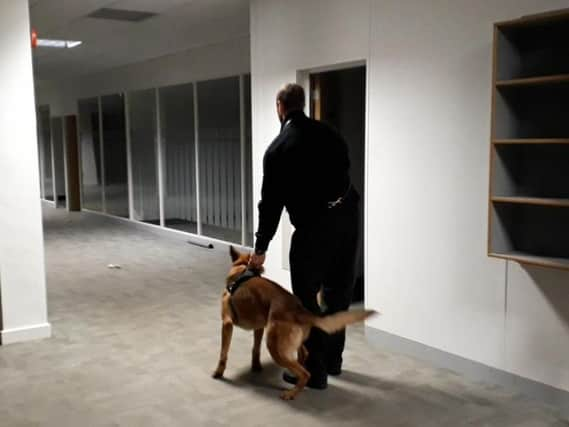

It’s an age-old game, the battle between those who seek to uphold the law and those who would profit from breaking it.
Somewhere, amid the empty filing cabinets and silent meeting rooms, hides an intruder, only too happy to stay in the shadows to avoid falling into the hands of the police.
Advertisement
Hide AdAdvertisement
Hide AdBut the officers who have ventured into these boarded up buildings have a crucial advantage.
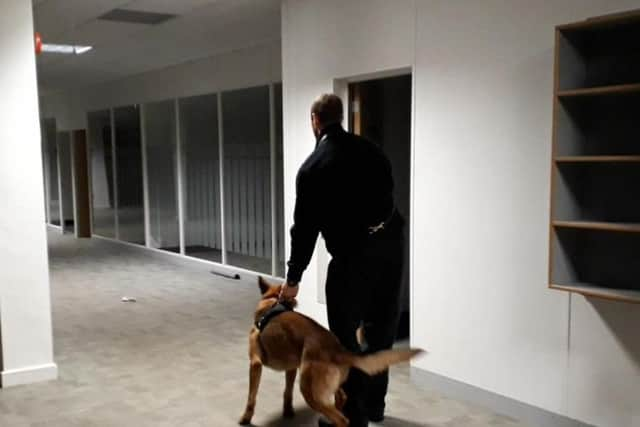

Police dog Sharkie has a nose for trouble and is only too happy to put it to good use.
Alongside his handler, he’s soon going room to room, the systematic search taking him ever closer to his target.
It’s the dog, not the handler, who leads the way and within minutes an excited bark tells you that Sharkie, an excitable German Shepherd, has his man... or in this case woman.
Advertisement
Hide AdAdvertisement
Hide AdThe miscreant in this case isn’t a hardened criminal, it’s one of Lancashire Police’s own – a member of the dog training team responsible for making sure the county’s four-legged officers are always ready to do their duty.
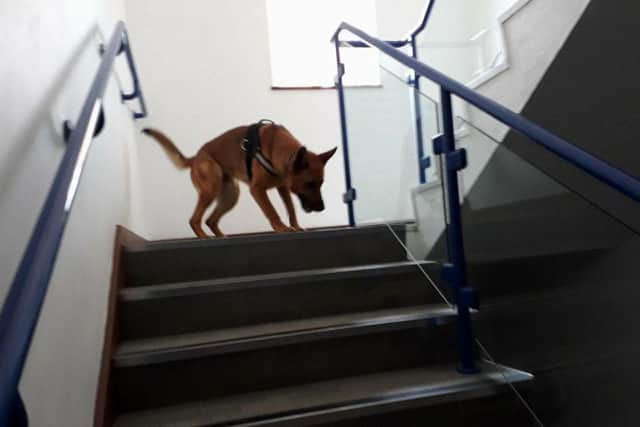

But training police dogs is far from straight forward.
Sharkie and his fellow canine recruits need to be put through their paces regularly not only to ensure they are able to do their jobs but to make sure the public are safe while they do so.
And to ensure every session is a real test for the dogs, Lancashire Police try to use as varied a range of venues as possible.
The former Axa offices in Lytham is the latest spot to become a training venue for the day.
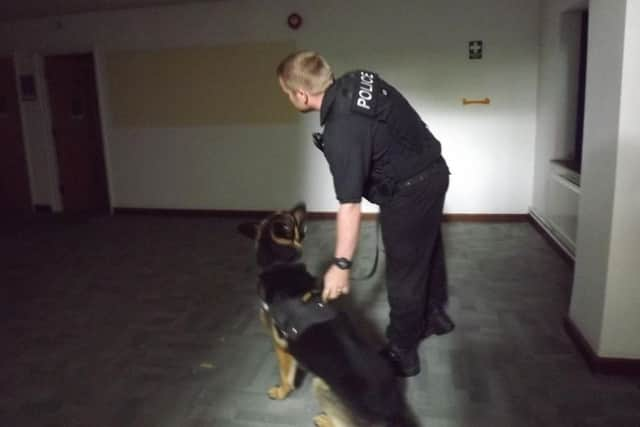

Advertisement
Hide AdAdvertisement
Hide AdFinding suitable sites is just one of the challenges for Sgt Paul Baker, one of the county’s top training team.
He said: “It can be difficult.
“We like the dogs to train somewhere different each time, so they don’t know the building, it isn’t learned behaviour, they are having to rely on their senses.
“Old office complexes like this are perfect.
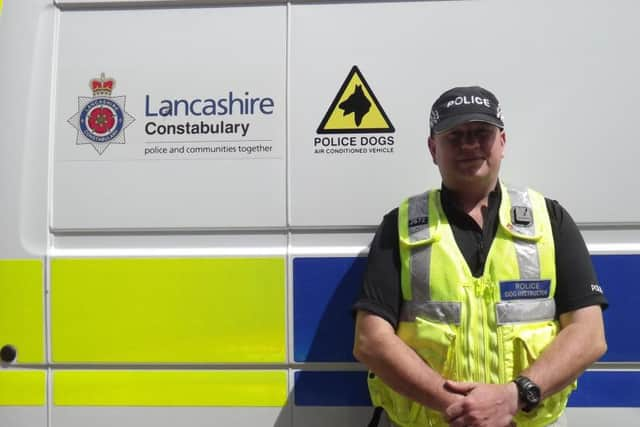

“We rely on people letting us in, it isn’t always easy to find them and we’re grateful when companies do.
“If anyone has somewhere we could train, we’d be grateful to hear from them.”
Advertisement
Hide AdAdvertisement
Hide AdAmong animals being put through their paces at Lytham are the force’s general purpose dogs.
They are the animals you’re likely to see on patrol at protests or to be involved when suspects are on the loose.
And they are far from your average family pet.
“We like to think of the dogs as controlled hooligans. They’ve got to have that energy, that level of intensity to them.”


Enjoying a workout alongside Sharkie is Frankie, a Dutch Herder who is nearly ready for his first taste of front line duty.
Advertisement
Hide AdAdvertisement
Hide AdIn the confined spaces of an office building the size of the dogs and their energy is clear, along with an outstanding focus.
The trainers use a variety of items to motivate their charges, including tough rubber balls, bite blocks and a padding-reinforced human arm.
When Sharkie races through the empty offices, toilets and meeting rooms, he isn’t necessarily on the hunt for a criminal.
“It’s called operant conditioning,” explains Paul.
“They give us the outcome we want they get the reward, in this case a ball.
Advertisement
Hide AdAdvertisement
Hide Ad“It’s like a child doing their homework and getting to play.
“Everything is reward based and not compliance, the dog wants to do the task, it’s like playing to them.”
And despite the myriad places to hide, these dogs do always find their man.
Trainer Anna Woods said: “We’ve had people hide in all sorts of places, in the walls, in the ceilings.
“The dogs have always found them.”
Advertisement
Hide AdAdvertisement
Hide AdWhile Sharkie and his kennel-mates have the ability to hunt down hiding criminals, it seems sometimes their mere presence is enough to bring the search to an end.
Entering a room the dogs bark echoes around the space.
Anna said: “When people hear that, they hear the dog and the handler they tend to give up.
“A lot of our ‘clients’ have had a run in with police dogs before, or know somebody who has.
“They know when to give in.”
Dog and handler not only work together, they live together, and share a very real bond.
Advertisement
Hide AdAdvertisement
Hide AdAnd each relationship is unique, handlers having to get used to the needs of a new dog when they take on a new partner.
Anna said: “The dog very much leads the way.
“The handler is there to guide, but how close they are, how much freedom they give the dog, that is different in every pairing.”
Despite a few distractions for the younger dogs, every single one proves their worth, finding the ‘criminal’ within minutes of deployment.
And each gets their reward, although separating dog and reward once training is done is not always an easy job
Protecting the public
Advertisement
Hide AdAdvertisement
Hide AdWith such powerful animals in their service Lancashire Police has a responsibility to keep the public safe.
That’s why alongside the search training, the dogs’ concentration and obedience is put to the test.
Three exercises - stand off, stop, and stick attack, are practices in yet another boarded up office.
In the first the dog is released, it’s handler calling for the dog to subdue but not bite the suspect.
Advertisement
Hide AdAdvertisement
Hide AdInstructions are shouted and in each case the dogs wait growling and barking, at a safe distance, until their handlers catch up.
The next exercise is a recall, should the dog be deployed in error.
With these ‘controlled hooligans’ it’s important to know a dog will stop if needed. The instruction, screamed at as high a pitch as possible, comes from the handler and is obeyed within seconds.
Finally the dogs are put through an attack scenario, a trainer rushing the handler with an iron bar.
Advertisement
Hide AdAdvertisement
Hide AdThe dogs leap into action, a single bite to the arm enough to halt the attacker in their steps and protect the handler and public from harm.
A range of duties
While the powerful German Shepherds may be the traditional image of a police dog, they come in many shapes and sizes.
Two-year-old Springer Spaniel Smudge was donated by the Manchester branch of the Dogs Trust.
He is one of the force’s sniffer dogs, trained to track down guns, drugs, money and other contraband.
Advertisement
Hide AdAdvertisement
Hide AdTheir training, like that of the general purpose dogs, all starts with a ball.
Smudge searches methodically for the hidden tennis ball, rewarded with a game of fetch when he pulls it off the shelf of a collapsing cabinet.
“We start off with the ball,” explained Paul.
“Eventually we start to associate the ball with the substances we want to detect.
“That involves hiding the ball in breeze blocks with the scent we want to the dog to associate with the reward.
Advertisement
Hide AdAdvertisement
Hide Ad“They come to associate the scent with the ball and, of course, always get the reward.”
The process produces dogs capable of tracking down a variety of different items.
And Paul is keen to add to the list.
“Spice is the next big thing we’re working on,” he said.
“It’s one of the big problems right now and we want the dogs to be able to detect that.
“The training, the association, will be done in precisely the same way.”
Advertisement
Hide AdAdvertisement
Hide AdOther specialist dogs on the force work with the forensic teams.
These CSI dogs are trained to find blood and semen, assist with body recovery.
They are also now trained in ‘digital recovery’.
Paul explained: “A lot of people won’t know but our dogs are now capable to tracking down mobile phones, hard drives, sim cards and other electronics.“You really cannot keep anything hidden.”
Can you help?
Lancashire Police is currently appealing for people to help provide the next generation of police dogs.
Advertisement
Hide AdAdvertisement
Hide AdThe force has a number of avenues open to it, but the general public can play a part.
Paul explained; “We are asking people right now to gift us dogs.
“That’s important to say. We aren’t asking to borrow dogs, they will be trained and remain with the force.”
But not every animal will make the grade.
Paul said: “We are looking for very specific characteristics.
Advertisement
Hide AdAdvertisement
Hide Ad“They have to be totally ball focused, have that attention span.
“This isn’t something your average family pet will have.
“Out of 15 or 16 dogs, two might have what it takes.
“We give them a four week trial to see if they have what it takes.
“We will only take the best.”
Other routes are open to the force, with criminals potentially footing the bill for recruitment.
Trainer Ian Tydsley explained: “One of the things we’re looking into is the Proceeds of Crime Act.
Advertisement
Hide AdAdvertisement
Hide Ad“We’re looking to see if we can get cash, from money seized from organised crime with which we can buy dogs.
“It would be a great way to make the proceeds of crime pay for our work catching criminals.”